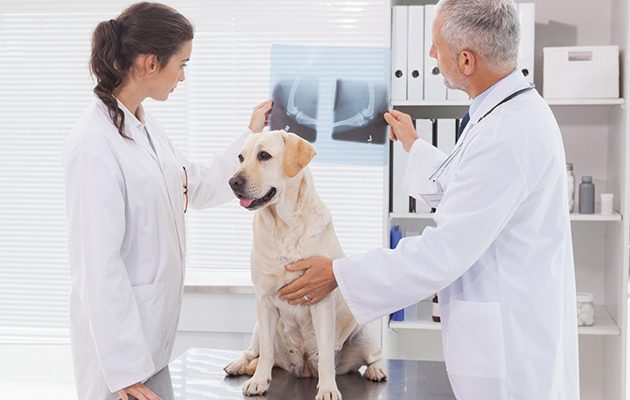We may not know the name of our GP but most of us can name our vet, says David Tomlinson. The increase in big, corporate bodies could be set to change that
With the big, corporate bodies moving in, small veterinary practices are being swallowed up into corporate chains. No longer will we be taking our dogs to a vet that we know and trust.
For more on gundog healthcare, read gundog hereditary diseases to learn about the price our pedigrees are paying after we’ve indulged in years of selective breeding.
THE DECLINE OF THE SMALL VET
I was recently asked the name of my doctor: I hadn’t a clue. On my rare visits to the local surgery I have rarely seen the same doctor twice. Ask me the name of my veterinary surgeon, however, and it’s a different matter. We are on first-name terms. That’s not because my dogs are frequent visitors but because I have a different relationship with my vet to my doctor. I’m paying him for his services whereas when I go to see my GP I feel guilty about taking up his or her valuable time.
Sadly, the veterinary world is changing radically. Private practices are disappearing as big, corporate bodies buy them to add to their empires. Numerous small practices have already been swallowed up into corporate chains. It can be argued that this is a good thing as big companies can buy drugs at a much more favourable rate, keeping prices down.
However, on the debit side is the fact that small businesses that are part of a large company invariably have financial targets to meet and this can compromise decision-making. There’s also far less chance that you will get to know your vet personally, which can’t be a good thing. We all like taking our dogs to a vet who knows them individually.
I discussed this with my vet on my last visit. He felt unhappy about the direction in which the veterinary business is heading but added that it was inevitable. “Ten years ago my financial adviser told me that I shouldn’t regard my practice as my pension fund, as there was little chance of it being worth very much when I retire. That’s not the case anymore. This means that it’s unlikely that a junior vet in the practice would have the capital available to buy it, which used to be the case before the corporates moved in.”
Another subtle change is the growing reluctance of graduate vets to undertake anything surgical other than routine operations. They are worried about being sued if anything goes wrong, so prefer to send the dog on for referral to a specialist clinic. This is invariably the expensive option, which is acceptable to those whose dogs are insured but is a worry for the many people with working dogs who can’t afford to insure them.
INSURING YOUR DOG
I always used to insure my dogs but when the eldest reached the age of seven and her annual premium was close to what I would expect to pay for insuring a Porsche 911, I decided not to renew. That was a mistake, as she developed a mystery illness my vet was unable to diagnose and spent a week at Dick White Referrals at Newmarket, the leading veterinary hospital in East Anglia.
She received impeccable treatment and, against the odds, surgery saved her, though my bank balance was £6,000 lighter. It was money well spent, as she was able to resume her picking-up career until retiring at 12. As I write this she is days away from her 15th birthday and, remarkably, is not on any medication. My insurance would have only paid the first £2,000 of the claim in any case.
This experience hasn’t changed my views on insurance: a calculated gamble. When you acquire a new puppy, open an account in the dog’s name and pay in £20 a month. The odds are that you will never need to draw on the account but if you do you should have a substantial sum available to help with bills.
However, there’s no doubt that insurance has changed the business of small-animal care in this country, making it arguably the best in the world. On the Continent, where insurance for dogs is far less usual, few vets have the expertise or experience to undertake what we regard as relatively routine, if expensive, procedures. The result is that far more dogs are put down: my spaniel would almost certainly not have survived.
In recent years, the nature of our relationship with our vet has changed, too. Not so long ago our dogs would be taken to the vet annually for their booster inoculations, long thought to be essential to control diseases such as distemper and parovirus. However, vaccine manufacturers have been unable to come up with data that proves a need for annual jabs, while there is the worry that repeated vaccinations reduce the animal’s immune resources and possibly cause disorders such as degenerative joint diseases and reduce the dog’s ability to ward off diseases naturally. As a result, the annual booster, for so long a reliable form of income for the vet, has become a thing of the past.
Most people believe that a puppy should still receive a course of vaccinations against the four main infectious diseases: canine distemper, hepatitis, parovirus and leptospirosis. You should then be able to rely on your vet for information about the need for further vaccinations (leptospirosis should be annual). That’s much better coming from a vet you know and trust than from a faceless corporate out simply to make money.





